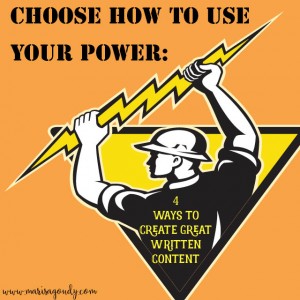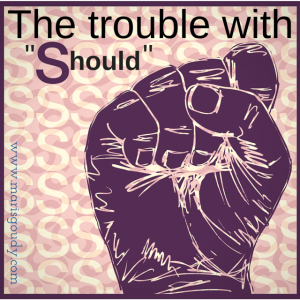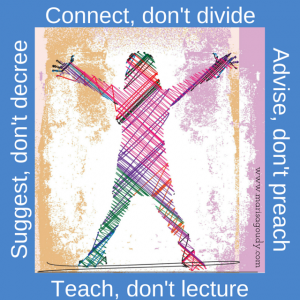
BLOG
How to Crack Your Readers Wide Open
Sovereign Standard, Issue 23 Open letters aren’t new.
Open letters aren’t new.
The Bible is full of them. The advent of the printing press gave secular writers the chance to play the “Dear Joe, I’m going to write to you personally in order to tell everyone how much I disagree with you” game.
And, of course the internet has given all of us the power to reach multitudes with one carefully aimed piece of prose.
This week, writer and activist Naomi Wolf published an open letter in Britain’s The Guardian newspaper.
Young women, give up the vocal fry and reclaim your strong female voice had such promise! A famous feminist appearing in a major publication to speak to young women about using their powerful voices? Who cares that I had no idea what “vocal fry” was… I was prepared to read, heed, and share.
It turns out “vocal fry” is a speech pattern adopted by Millennial females. Apparently it’s a Kardashian thing, but since I pride myself on ignoring them completely, I needed to watch the video to figure out what it is.
[embed]https://youtu.be/YEqVgtLQ7qM[/embed]
According to Wolf:
Vocal fry” has joined more traditional young-women voice mannerisms such as run-ons, breathiness and the dreaded question marks in sentences (known by linguists as uptalk) to undermine these women’s authority in newly distinctive ways. Slate notes that older men (ie those in power over young women) find it intensely annoying.
The video is hyper critical. Old guys allegedly hate it. But, to be honest, I’d never even considered creaky voice syndrome before.
Was that because I don’t hang with enough twenty-somethings? Wait, I do! Are my daughters’ babysitters teaching them to croak and I’ve never noticed? Or (worst of all) is it because I do it myself?
Open Letters that Crack Open the Reader's Inner World
 At 11 PM when you’re reading one last article before you brush your teeth (even though you know late night screen time is the #1 sleep killer) the last thing you need to do is start reviewing your own YouTube clips to figure out if your vocal patterns would irritate the majority of the members of the Supreme Court.
At 11 PM when you’re reading one last article before you brush your teeth (even though you know late night screen time is the #1 sleep killer) the last thing you need to do is start reviewing your own YouTube clips to figure out if your vocal patterns would irritate the majority of the members of the Supreme Court.
I considered pulling out the headphones to do just that. But then I found an open response that saved me from all that paranoid analysis.
In An Open Letter To Naomi Wolf: Let Women Speak How They Please Debbie Cameron offers:
What’s really destructive and undermining to women is not their way of speaking but the constant criticism to which their speech is subjected. Telling women their speech habits are bad and wrong is not going to make them more confident speakers: it’s more likely to reduce them to silence. Continually repeating that women’s speech lacks authority just gives people yet another reason to dismiss whatever they say as unworthy of serious attention.
Debbie Cameron, we just met, but I’m sort of in love with you (and I say that without an upspeak question mark that would in any way limit my authority because I am so damn sure about how awesome you are).
I'll be listening for vocal fry in myself and others, but you stopped me from obsessing about it before I even had a chance to start. I've got video production plans in the works so it means the world to me!
What does this have to do with why your writing matters?
Whether or not you’re particularly concerned with your own speech patterns or those of the rising generations (though I hope you are since these women are or will be your clients and customers!), there’s one thing to take away from all this:
These open letters were powerful enough to push my bedtime back by an hour as I reconsidered something as fundamental as what happens when I open my mouth.
You have this power too.
Essentially every blog post you write is an “open letter” to your ideal client - and it could change everything.
Demian Farnworth has a great podcast episode about how effective it is to address every blog post to one person and start with "You've been on my mind lately." (Of course you won’t publish those words, but that’s what’s in your head as you write.) That approach instantly prepares you to write about what really matters to the audience members who matter the most to you.
Write about something that speaks directly to the concerns and, yes, insecurities of your ideal client and you’ll open up doors to their inner world. The question is - what solutions will you offer once you’re inside their inner sanctum?
The Sovereign Standard is a weekly newsletter that invites you to explore writing, entrepreneurship, and everyday creative magic from a fresh angle. Subscribe today!
Choose How to Use Your Power: 4 Ways to Create Great Written Content
Sovereign Standard, Issue 22 We live in an abundant universe and we are the ultimate authors of our lives.
We live in an abundant universe and we are the ultimate authors of our lives.
That’s all fine and good, but you only have so much time to write your business’s stories and get that blogging done.
How are you going to use your power?
“Write this week’s post” or “update the website copy” are on your to do list. You've decided to apply your power to crafting your ideas into words and sharing them with people who want lives that are more beautiful, bearable, or bold. Yay!
 And you intend to take the ideas from draft to final copy all by yourself because you love to write, you’re on a budget, or because you fear you’d sacrifice authenticity if you outsourced it… but is that the right choice? Is that how you really want to use your power?
And you intend to take the ideas from draft to final copy all by yourself because you love to write, you’re on a budget, or because you fear you’d sacrifice authenticity if you outsourced it… but is that the right choice? Is that how you really want to use your power?
As I write this, my five year old is trying to make the Eiffel Tower out of mostly dried up Play-Doh. I am only 95% sure that the markers my toddler is using to draw all over her t-shirt are washable.
My maternal powers are diluted and I'm sure every paragraph I write is riddled with typos.
But I am making it work. I choose to see myself as powerful - at least according to Michele Woodward’s definition.
“Power is the ability to get stuff done.”
This definition was a common refrain in a recent How She Really Does It podcast in which Michele and Koren Motekaitis put a positive spin on power. Yes, we all have the capacity to build and store power, but how are we going to use power in helpful, efficient ways?
Choose How to Use Your Power: 4 Different Ways Create Great Written Content
You’re on board with content marketing. You’ve been storing up stories and ideas for ages. Your website looks great and is waiting for the right copy and a consistent blog.
It’s time to channel your power and get this writing stuff done. How do you make that happen?
The answer isn’t necessarily simply “go write.”
1) Give it up: Outsource your content writing completely
You can fully empower a ghostwriter to do it all from topic research to writing to image selection to posting the piece.
When this works best: There are lots of news and information sources related to your field that a trusted writer can review and translate for your audience based on your company story. Early in my writing career I combed the medical research and did this sort of blogging for a nutritional supplement company.
When this doesn’t serve you: If you have a personal brand, it’s reliant on your voice and your stories. This hands-off approach doesn’t generally serve coaches, healers, or those who sell information and wisdom that stems from personal experience.
2) Team up: Partner with a writer
Develop a relationship with a writer who becomes part of your team. She’ll get to know you, your brand, and your vision and ask questions from an outside perspective that will help expand your vision of what you’ll have to offer. You’re part of the brainstorming process but she takes care of organizing all the ideas and making the words sing.
When this works best: You have a ton of big ideas and general concepts you want to share. Your business is strong enough that you can afford to invest in this process – good writers will require a lot of time and attention at the beginning as they endeavor to really understand you, your voice, and your brand.
When this doesn’t serve you: Even though you are very involved in the process and will be the instigator of every piece of writing, you’re a step removed from the process. Since you’ve both agreed that the writer would publish under your name and you paid for the service, the intellectual property is yours and the product is 100% yours. But, if you have a writer’s soul you may not feel that this option suits your needs.
3) Tune up: Hire a Writing Coach
When you work with a writing coach, it's your writing - only better. A writing coach will help you meet your editorial goals now and build skills that will take you far into the future. Plus, you'll have the insights that only a "second pair of eyes" can really offer. This makes you a better writer and it also helps you dig deeper into your own stories and wisdom.
When this works best: Writing doesn’t come all that easily to you, but you want to get better at it. Or maybe it's easy for you to fill "ideas" notebooks but you never make the time to turn that material into polished posts. You also worry that your writing style doesn’t lend itself to the needs of the skimming internet audience. No matter what, the stress over making it perfect kills the joy you find in the process.
Learn more about the writing coaching relationship.
When this doesn’t serve you: Your business is at a stage where you’re more focused on scaling your business and landing speaking gigs. You don’t harbor any dreams of being a writer and would be better served partnering with a writer who can translate your ideas into prose.
4) Train up: For the bootstrapper who has time to teach herself the craft
Writing is a skill. The more you practice, the better you’ll get at it. There are loads of resources out there from Copyblogger’s free library and paid training programs to big old books on the subject like the Copywriter’s Handbook by Robert W. Bly. I refer to both when I’ve written myself into a corner, I need inspiration, or I need help remembering that writing for the internet is more about selling than writing much of the time.
When this works best: You have more time than money to invest in sharpening your writing skills. You likely trust your writing skills enough and enjoy writing enough that you can follow a set of tips to tune your craft.
When this doesn’t serve you: Writing scares you and depletes you and you’re intimidated rather than energized by the DIY approach. You understand that consulting with an expert who is focused on your individuals needs and challenges will help you build your business and your writing skills faster and more efficiently.
How will you use your superpowers to get more of the vital work done?
I’ve been “the writer” in all these situations. Because every entrepreneur, creative, and healing professional has her own needs and superpowers, each writing approach is valid.
At this stage in my career, I see my clients experience the most personal growth and satisfaction when they go the writing coaching route. In addition to producing great content today, they’re preparing themselves to handle a marketing scene that will always demand good writing. And when it’s time to write that book? They’re ready.
How can I help you amplify your superpowers? Check out the services page.
How to Heal Chronic Internet Fatigue Syndrome
Sovereign Standard, Issue 21 What’s the number one reason bloggers quit writing?
What’s the number one reason bloggers quit writing?
Forget that… what’s the number one reason you want to quit the writing practice that's mean to build your business or your professional platform?
Because nobody seems to read what you write, right?
It’s one thing to know that most online readers are just skimming, it’s another to feel like you’re not even reaching those eyeballs.
 You slip into despair if your site stats don’t match up to the investment you made in the post. Who can blame you? Writing a from-the-heart, meaningful, useful post every week or two takes a lot out of you, but it’s a labor of love.
You slip into despair if your site stats don’t match up to the investment you made in the post. Who can blame you? Writing a from-the-heart, meaningful, useful post every week or two takes a lot out of you, but it’s a labor of love.
It’s the next step, the “doing social media” to get the link in front of prospective clients and readers that pushes the whole venture into mission: impossible territory.
Unless you have a fully charged phone while you’re in line at the DMV or killing time someplace similar. In that case, you have time to share the blog post on every social media platform you’ve ever heard of.
Those deep dives into social media can be really useful, but soon they teach you something vital...
Social Media Isn’t About Posting Strategy or Likes, It’s About Real Relationships
Getting people to read what you write really isn’t about crafting Tweets and status updates and making everything sweet-as-pie Pinnable.
If you don’t have the online relationships, even the best piece of content is likely to languish in obscurity on your under appreciated blog.
As social media matures and the networks figure out how to monetize their “free” platforms, it becomes increasingly hard to hear and be heard above the noise.
Instead of tuning in to every Mari Smith email and Social Media Examiner podcast like I used to, I’m focusing on nurturing real connections with people I care about. It's the only way to heal a modern disease I bet you know all too well...
Are you suffering from Chronic Internet Fatigue Syndrome?
My case of Chronic Internet Fatigue Syndrome flares up regularly. Sick of the sales pitches, the false promises, the self aggrandizement, and the sheer meaninglessness of it all, I burn out and hide myself in a few good novels. (Or a Candy Crush Soda binge… don’t judge me.)
During these hibernation periods I tend to lose hard won footing in the social universe. The disappearing acts make me seen inconsistent and, hence, I'm easily forgotten or dismissed.
It’s easy to claim “because my kids” but really, I just can’t sustain these online “connections” that aren’t forged in real, sustaining reciprocal relationships.
At the early stages of building a platform and becoming a trusted voice in your area of expertise, it feels like it’s all about giving, producing, and introducing yourself. It's so easy to burn out. Eventually, you’ll reap what you sow and see a return on all that effort, but only if you are offering yourself and your writing to the right people.
The Writer’s Cure for Chronic Internet Fatigue Syndrome?
 Reach.Connect.Uplift Women
Reach.Connect.Uplift Women
As with any chronic ailment, the goal is to break the cycle and enjoy sustained health and vitality. You want to find a sustainable online community that loves to read what you write and offers up content that betters your personal and professional life as well.
You do, right?
Ok, so come join me over at the Reach.Connect.Uplift Women Forum because I think it’s the cure for digital burnout.
Just when I realized I needed to break my feast or famine social media efforts and focus on an online community that gave as good as it got from me, founder Lany Sullivan told me about how the RCUWomen Google+ group was migrating to its own membership forum.
As Lany describes it, "We decided to go old school and build a forum on our website that we could really let loose and have a broader reach. "
What, it's 2015 and we're back to a message board? If you're getting lost in the social media crowds, it may be just the medicine your content creator's soul craves.
Here's Lany's explanation of "why a Reach.Connect.Uplift Women Forum, why now?":
We want a platform that allows us to really highlight our members, provide valuable resources, and be able to monitor and manage it with maximum efficiency. Social Media doesn’t do that for us or our members.
Building an audience off social allows us to have a greater impact, better connections and deeper relationships with our members. Instead of sifting through the millions of posts on social everyday, our members can drop by the forum for some of the top content in the market. Plus, we have some additional SEO and link building benefits that has a positive impact for everyone.
So, will you join me over on the new forum? My social streams and my inbox are too full and I'm missing your great content, but I know I'll see it if you become a RCUWoman too (and guys, if you've got the stones to join the ladies, we'd love to have you too!)
Want to connect with your reader? Cut "should" from your writing
Sovereign Standard, Issue 19  Nobody likes a “should-er.” (No, not shoulder… we all need a shoulder to cry on sometimes and the entire game of baseball would be wrecked if there weren’t shoulders to rest the bats on.)
Nobody likes a “should-er.” (No, not shoulder… we all need a shoulder to cry on sometimes and the entire game of baseball would be wrecked if there weren’t shoulders to rest the bats on.)
 I’m talking about that evil “s” word - “should.”
I’m talking about that evil “s” word - “should.”
“You should…” reeks of unsolicited advice, shaming, and regret.
I check every piece of writing I publish to be sure that I avoid that “s word.” Readers come to me for insights into how to write brilliant stories and copy to support their creative work. You’re not coming to me for a wagging finger and the implication “you likely know better, but you’re still doing it wrong.”
“Should” damages personal relationships & teaching relationships
This is from Hannah Braime in Why the Word “Should” Can be Harmful and 3 Empowering Alternatives. Substitute “authority in your field” for “friend or partner”:
I realized that when I told other people they should or shouldn’t do something, I wasn’t respecting their ability to make the best decisions for themselves. That didn’t fit with my personal philosophy (that people are free to do what they want as long as they’re not harming others), and I knew I wasn’t being the best friend or partner while I was using “should”-based vocabulary.
I love what teacher John Spencer has to say about the problem with should. Replace “teaching” with “educating, engaging, and inspiring through content marketing”:
See, the problem with "should" is that it places all of teaching into rigid, binary, either/or, right/wrong boxes. It takes away the individuality, the autonomy, the creativity and the contextual knowledge required to teach well. Any strategy, any tool, any medium, any resources has benefits and drawbacks. The hard part, the part that requires patience and humility, is learning how to refine our craft as teachers based upon the needs of students.
But “should” is such a handy word for authorities, isn’t it?
Mentor and consultant Blair Glaser has made the brave and beautiful decision to leave leadership for authority. She’s making “authority” sexy - so stop thinking about buttoned up authority figures and start imagining a connected, compassionate someone who walks her talk and knows her stuff.
Her first paragraph in the blog post that announces her shift away from leadership and toward authority is laden with “shoulds” (underlines are mine!):
Read enough [books on leadership], and you’ll start to see a formula on how leaders should BE: authentic (hard for many to really know what that means); humble; curious; calm, empathetic, open, and funny.
You’ll also collect a list of behaviors of what leaders should DO: Serve (this can border on religious); listen more than talk, and empower by coaching.
They shouldn’t act bossy, they don’t “manage,” and, heaven forbid, they certainly don’t micromanage.
Blair goes on to describe her vision of authority (by the way, there isn’t a single “should” in the post once she starts riffing on her beloved new concept):
Personal authority comes from the ability and willingness to be the author of our own lives.
Authority in this context is the antidote to feelings of helpless and hopelessness, to the victim role. With a little work you can find your authority in almost any situation.
As I like to say, authority = confidence plus creativity. This is what makes authority irresistible as a force that will draw people to you.
Based simply on how Blair phrased these passages, what you rather strive to be -- a wannabe leader who is always looking over her shoulder trying to follow the shoulds and avoid the should nots OR an authority who employs creativity and confidence to be an irresistible draw?
You don’t need “should” to own your authority and offer advice that matters
The word “should” inherently separates.
If you berate yourself with “I should’ve…” language you’re creating a barrier between an ideal you and a real you that never measure up (I should eat better, I should sleep more, I should return emails faster…).
If you fill your writing with shoulds you stand apart from the reader, creating an ideal world that may make them feel inadequate.
 Connect, don't divide. Teach, don’t lecture. Advise, don’t preach. Suggest, don’t decree.
Connect, don't divide. Teach, don’t lecture. Advise, don’t preach. Suggest, don’t decree.
There’s almost always an alternative to “should” in any sentence you write. Substitute a more evocative, specific word and watch your blog posts and other professional writing take on a new tone that invites people to learn more from you - the compassionate, down-to-earth authority who is always there to help.
I’m always here to help you with your writing whether it’s in fine tuning your word choice or developing your editorial strategy. Learn more about what I have to offer on my services page.
Before you waste a summer day inside writing a blog post, read this
Sovereign Standard, Issue 18  This year, you're going to put “lazy” in hazy days of this summer - in a very good way.
This year, you're going to put “lazy” in hazy days of this summer - in a very good way.
You deserve this kind of warm weather downtime. You need long days of lazy moments in order to replenish your creative resources. A good break is what you need refill your well of patience and compassion - for your clients, your family, and yourself.
In order to make time for those guilty pleasure novels and to be truly present for the firefly chasing, you have to make the hours you do work a heck of a lot more efficient.
What part of your business needs to become quickest and easiest as the temperatures rise? The thing you’re most likely to ignore and procrastinate about -- your blog and your newsletter writing.
Your business needs you to keep writing this summer, but you need summer to be like summer
 It may be tempting to hang a “see you in September” sign on your blog, but you’d be missing a valuable opportunity. Many people use their “lazy” summer time to Google fresh solutions to their problems and do that professional research they never have time to do during the average work week.
It may be tempting to hang a “see you in September” sign on your blog, but you’d be missing a valuable opportunity. Many people use their “lazy” summer time to Google fresh solutions to their problems and do that professional research they never have time to do during the average work week.
Imagine this: while you are on the beach with your kids, someone is replying to your email newsletter and asking to set up an appointment that will guarantee you have enough money to pay for that last week of summer camp.
That is so much more likely to happen if you stay present online during July and August by publishing quick, meaningful blog posts and keeping in touch with your list.
The one thing you have to do to produce those quick, meaningful summer blog posts (Hint: it’s not about brainstorming ideas or composing a killer title)
You need to simplify.
For many creative entrepreneurs, “simple” is a bad word - it implies facile and “simplistic” and your work is deep and meaningful (dammit!).
Or, “simple” is an impossible dream. When a business sits at the core of your livelihood, your creative output, and much of your sense of self, it’s bound to be a nuanced, multilayered affair.
If you feel like the business is entangled in just about everything, writing for your personal stories for your beloved clients is anything but quick and easy.
Yes, friend, you are as rare as a glitter dusted zebra-striped unicorn and as complex as Superstorm Sandy, but your next blog post doesn’t need to be - really!
Two ways simplify the story and produce blog posts before they even miss you at the beach
1) Give 25%. You had a flash of insight during your morning jog? Jot down as much as you can then walk away for a while.
Come back to your notes and ask yourself how many ideas were really included in that flash of insight. It wasn’t just one perfect ah-ha - you were pounding the pavement for a good 45 minutes! You don’t want to get stuck inside writing a 3000 word epic. You want to offer up 750 words of succinct quality content. Either strip away all the extra stuff and toss it as the unnecessary padding it is or save it for next week’s post.
2) Recycle. Didn’t have a stroke of brilliance during your run? (Because, honestly, it’s vacation and there was that last bottle of chardonnay that just had to be finished before bedtime.) That’s great.
Go back and read one of those wicked long posts you dragged out of yourself over the winter. You know, one of the missives that you yourself have trouble reading all the way through? Pluck out one idea and expand on it. Or, if you’re proud of all the content because it’s central to your brand vision, break it into an easy-to-digest list and pare down the language for your lazy summer readers.
Simple writing takes practice
There’s this delicious Italian word, "sprezzatura.” It means “studied nonchalance.”
Someone who exhibits “perfect conduct or performance of something (as an artistic endeavor) without apparent effort” is simply glowing with the qualities that marked a successful 16th continental century courtier.
I learned about sprezzatura when studying Yeats as an undergrad. If anyone slaved himself to produce a line that was achingly simply and painfully profound, it was that Irish poet. But, he kept it up for a lifetime and became one of the greatest writers who ever lived.
You, my sweet summer friend, may also be destined to earn a Nobel Prize one day. I won’t stop you from delighting in every difficult task related to reaching that great height, but I will remind you that the blog posts your writing during the summer of 2015 are not going to make or break your chances with the Scandinavians.
It’s hard to simplify your ideas and to offer the quick and easy version of your brilliance because something as foolish as enjoying the sunset demands your attention, but if you’re going to be worthy of that next client - or that Nobel Prize - you have to give it your best shot.
I'm here to help you discover your own simple writing style. Let's talk about how hiring me as your writing coach can ease your summer writing load.
